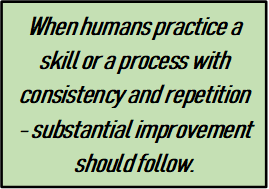Practice without Improvement – A Title 1 Invariant!
- by Blaine Helwig
- Nov 27, 2018
- 4 min read
Updated: Jun 9, 2021
“How do you get to Carnegie Hall?”

This old joke is amusing and timeless because of the obviousness of its one-word punchline: Practice!
In the course of human endeavors, regardless of the nature of the task – if a person applies consistent repetitive practice, there should be significant skill or process improvement. For instance, if an adolescent or an adult consistently practices the guitar, reads books, lifts weights, dribbles a basketball, works algebraic equations, studies French, climbs trees, plays video games, etc. each week, it is fully expected that their skill and process ability will appreciably improve.
But, what happens if a human being does not significantly improve in ability at either a skill or process after consistent and repeated practice?

Well, for obvious starters, there must be a fundamental or critically important flaw in their technique or methodology. The critical defect in their daily practice is frequently and invariably detected by more experienced and successful practitioners in that specific area of study, task or endeavor. Hence, an exacting, motivating and effective ‘coach’ is quite often exceedingly valuable in rectifying poor performance. After observing and analyzing a person’s practice repertoire, a coach often recommends specific interventions that remedy or greatly lessen inefficiencies that lead to elevated levels of success.
Again, what happens if a human being does not significantly improve in ability at either a skill or process after consistent and repeated practice – and after a competent coach intervenes?
At that point, the probability is quite high that an unaddressed core, rudimentary issue is at play in the process yielding poor outcomes. Mike Leach, head football coach of the Washington State Cougars, stated after his team’s loss to their in-state rival last weekend, “When you break football performance down to its core elements, it always comes down to a team’s ability to block and tackle well. If a team does not do those two things well, they lose.” However, the important point here is not something as trivial as a college football game, but the recognition that there is a critical fundamental core to human tasks and processes that dramatically affects overall performance. And, when either adults or children consistently practice a process or a task with coaching, but do not do well, something essential in the process or methodology is amiss.
The Title 1 Elementary School Invariant: Practice without Improvement

All Title 1 and non-Title 1 elementary teachers and campus administrators show-up each school day and practice with their students. They practice social skills. They practice reading and writing. They practice math, social studies and science. They practice learning approximately 175 days a year for approximately 315 minutes [LA – 150 minutes, Math – 90 minutes, Science 45 minutes, Social Studies – 30 minutes] each school day with their students.
What is the end result of all that practice that totals 175 days multiplied by 315 minutes or 918 hours of total practice time?
At the end of the school year, non-Title 1 elementary schools invariably yield high student outcomes on standardized assessments; whereas, the majority of Title 1 schools produce significantly lower – or approximately the same student performance as the year prior.
How can this be?
The Title 1 elementary schools practiced – as did the non-Title 1 elementary schools during the school year. Without any doubt, as a retired Title 1 elementary principal, I can guarantee the mass of teachers desperately care – desiring social and academic prowess for their students. But, student outcomes remain chronically unchanged from year-to-year, despite another school year of practice. Title 1 students did not equitably excel with competent and caring adult coaches to assist them each day. In effect, much, much daily practice in our most needy schools without significant improvement for the last 75 school years.
As a cautionary note, standardized assessments are not the ‘end-all, be all’ for students. However, it is a marked indicator with comparative value; children of poverty’s more affluent peers are not struggling on these grade-level yearly assessments. Simply put, these yearly tests assess not only grade-level skills, but prerequisite skills that must be mastered for curriculum readiness for subsequent grade levels. Consequently, a fourth grade student possessing second grade math skills and third grade reading proficiency will unquestionably struggle when his fourth grade teacher presents fourth grade state standard curriculum.
So, what is the issue – consistent practice should also produce increased student outcomes in Title 1 schools?

In this case, there is an existential truth in chronic Title 1 performance: A fundamental issue that directly affects academic outcomes is NOT being addressed. For example, a Title 1 elementary school principal elects to improve student achievement by consistent and well-managed curricular teacher training for three hours every Friday afternoon. However, if the school’s academic performance does not appreciably improve at year’s end, then it is only logical to conclude that the teacher training is NOT addressing the fundamental issue that results in low student outcomes. In short, if the core issue was being directly addressed, teacher’s Friday professional development (practice) sessions would correlate to increased student outcomes. It is that simple.
Unfortunately, children of color and poverty continue to attend Title 1 schools that possess one certainty: The academic outcomes a Title 1 elementary school demonstrated the prior year will be roughly similar to the academic performance come this spring. Again, defying all human experience that is consistently engaged in repeated preparation: ‘Repeated Practice, but little to no Improvement.’




